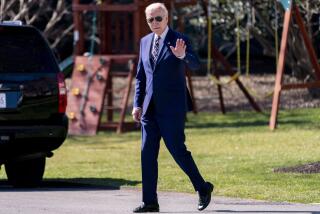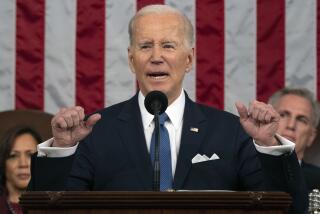Darman Says He Will Provide Budget Details
- Share via
WASHINGTON — Budget Director Richard G. Darman went to Capitol Hill on Monday and gave assurances to leading Democrats that he will fill in some of the blanks in President Bush’s spending plan as a basis for budget negotiations.
Darman’s visit came after strong Democratic criticism that Bush’s submission of a revised budget failed to specify where he wanted to make cuts or additions in the $136 billion worth of federal programs other than defense, Social Security and interest on the debt.
As a result of the 90-minute session with Darman, however, House Majority Leader Thomas S. Foley (D-Wash.) said there is a desire on both sides to work toward an agreement without acrimony.
“It’s not a teeter-totter situation where someone has to be winning or losing,” Foley told reporters. “It’s hardly a confrontational situation.”
Hard Negotiations Expected
Despite the appearance of harmony, however, congressional observers said they expect long, difficult negotiations that may drag out for months before the Administration and the Democrat-controlled Congress can resolve their differences--if they can reach agreement at all.
For his part, Darman agreed to meet again today with Sen. Jim Sasser (D-Tenn.), chairman of the Senate Budget Committee; his House counterpart, Rep. Leon E. Panetta (D-Monterey), and their staff experts to go over in detail Bush’s budget proposals for the fiscal year that starts Oct. 1.
During this review and during testimony before the two committees next week, Darman said he would provide the information in an orderly way on all aspects of the budget, including the Administration’s priorities on the overall freeze in outlays.
“I am optimistic that we can make more progress,” Sasser said. Panetta agreed and Darman said: “I am extremely encouraged by the tone of the meeting. It was very positive and very constructive.”
Foley described the talks as “an hour and a half of good will,” while stressing that the discussion centered on procedures for dealing with the budget rather than its substance.
Earlier, in a breakfast meeting with reporters, Foley said that Bush’s spending plan is “artfully crafted” and “superficially appealing” but that it does not provide enough information to form the basis for negotiations with Congress.
After the meeting with Darman, however, Foley said: “We are going to get additional information,” and the budget director said: “We mean to be fully cooperative.”
On a related issue, Foley said Congress is not going to approve any tax increase this year as long as the President sticks by the “no new taxes” policy enunciated during the election campaign and reflected in his revision of the budget submitted by former President Ronald Reagan.
“I’m not sure we’re going to get it (a tax increase) next year,” Foley said.
Although Bush has won applause from Democrats for proposing less money for defense than Reagan did and seeking more funds for a series of social programs than his predecessor, he also asked for a $5-billion reduction in Medicare, a $2-billion cut in farm programs and a one-time cancellation of cost-of-living adjustments for retired federal workers.
Automatic Cuts Possible
Under the law, the budget deficit must fall to less than $110 billion in the next fiscal year to avoid automatic, across-the-board spending cuts divided equally between defense and domestic spending programs. Bush has estimated that the deficit for the fiscal year ending Sept. 30 would exceed $170 billion.
Democrats have argued that the deficit cannot be reduced without unacceptable cuts in social programs unless new revenues are found. But Bush has proposed holding the line on spending for most domestic programs, even if this means actual reductions in services because of the impact of inflation.
More to Read
Get the L.A. Times Politics newsletter
Deeply reported insights into legislation, politics and policy from Sacramento, Washington and beyond. In your inbox twice per week.
You may occasionally receive promotional content from the Los Angeles Times.










